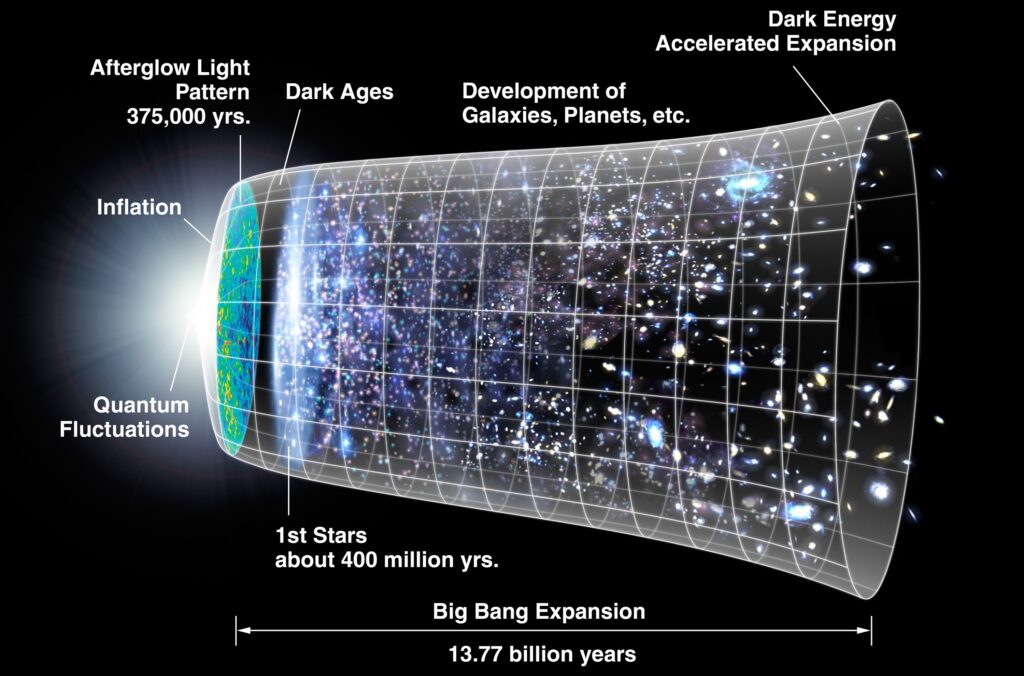
Introduction: Asking the Big Question – How Fast Is the Universe Expanding?
Space lovers constantly ask: How fast the Universe is expanding? Was it an explosion? Is there a center? What’s it expanding into?
The Big Bang wasn’t an explosion in space—it was the expansion of space itself. From a dense, hot origin, space has been stretching for 13.8 billion years. But just how fast is the Universe expanding today? To find that answer, we need to explore both past discoveries and present mysteries.
A Century of Insight Into How Fast the Universe Is Expanding
Back in 1929, Edwin Hubble made a historic observation: galaxies are receding from us, and their speed increases with distance. This discovery laid the foundation for Hubble’s Law, where:
Velocity = H₀ × Distance
This equation led to the first real attempt to measure how fast the Universe is expanding. Although Hubble overestimated the rate due to observational errors, his work set the stage for one of cosmology’s biggest questions.
Correcting Course: Refining the Hubble Constant
Initially, Hubble believed how fast the Universe is expanding was around 500 km/s/Mpc. Later corrections based on better “standard candles” like Cepheid variables and Type Ia supernovae reduced the number significantly. Today, estimates sit around 73 km/s/Mpc.
That means a galaxy 3.26 million light-years away is moving away from us at 73 km/s. Double the distance? Double the speed. This precise proportionality is at the heart of understanding how fast the Universe is expanding on a large scale.
The Surprise Twist: Expansion Is Accelerating
In 1998, astronomers studying distant supernovae found that galaxies weren’t just moving—they were accelerating. This discovery added complexity to the question: how fast is the Universe expanding, not just today, but over time?
The answer: it’s changing. The expansion rate isn’t constant—it’s speeding up. This led to the theory of dark energy, a mysterious force making up most of the Universe’s energy content and pushing galaxies apart faster and faster.
So now, how fast the Universe is expanding depends on when you’re measuring. The early Universe expanded slowly after inflation, but in the last few billion years, dark energy has taken over.
Microwave Echoes of Expansion
To answer how fast is the Universe expanding, scientists look at ancient light—specifically, the cosmic microwave background (CMB). Discovered in 1965, this leftover radiation from the Big Bang shows a snapshot of the early Universe.
Measurements from satellites like COBE, WMAP, and Planck show us how tiny temperature fluctuations evolved into galaxies and clusters. They also help calculate how fast the Universe was expanding in its infancy. Those early values differ slightly from today’s—leading to a growing mystery in cosmology.
Hubble Tension: Two Answers, One Universe
Here’s the conflict. When we measure how fast the Universe is expanding today (using Cepheids and supernovae), we get around 73 km/s/Mpc. But when we look at the CMB—how fast the Universe was expanding 13.8 billion years ago—we get about 67. This mismatch is called the Hubble tension.
Why the difference? It could mean we’re missing something major—like a new particle, a tweak to gravity, or even new physics altogether. For now, we just know the answers don’t line up.
Where, What, and Beyond: Space That Grows
To understand how fast is the Universe expanding, you need to let go of old ideas about space. The Universe isn’t expanding into anything. Space itself is growing everywhere. There is no center. Every galaxy sees others moving away.
This makes answering how fast the Universe is expanding more about measuring space itself stretching, not objects flying apart through it.
Conclusion: Measuring the Greatest Motion of All
Let’s bring it home: How fast the Universe is expanding? Right now, about 73 kilometers per second per megaparsec. But this isn’t fixed. It was slower in the past. Now it’s speeding up. And depending on how we measure it, we get different numbers.
Still, every redshifted galaxy, every fading supernova, and every bit of cosmic microwave background helps sharpen the answer to this enormous question: how fast is the Universe expanding?
We might not have the full picture yet. But one thing’s for sure—we’re living in a Universe that’s not standing still.